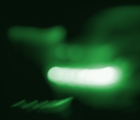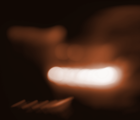
Photo CreditKrzysztof Zatycki
Surrender and transformation: The soulful truth of Ben Caplan
Author: Seamus Cowan
Published by: The Review-Mirror
There is a man named Ben Caplan, who fits this description. Sadly, I have yet to see him live, but we are so looking forward to having him come to perform at this little old lodge by lake and wood. As part of the Festival of Small Halls in Ontario, we are honoured to present this inaugural edition and this great Canadian folk artist on Friday, November 28, 2025. Dinner and show or just show tickets can be purchased online here: web link
Seamus Cowan: When one thinks of you, they usually think about your very singular sounding voice. I’m sure I’m not the first to mention this, but do you have any sort of influence with it, or did it just develop over the years?
Ben Caplan: I wish I could say there was some grand plan behind it, but honestly, it’s mostly the result of time and life. I was never trained formally as a singer, so I found my voice by trial, error, and necessity. I grew up listening to a lot of gravelly singers like Tom Waits, Leonard Cohen, even some Eastern European cantors. I absorbed a lot from that. There are some horn players who have been really influential for how I think about breath, phrasing, and timbre - especially Louis Armstrong and John Zorn. But more than influence, it’s really about emotional truth. The thing I always strive for in my singing is honesty.
Q: Your songs and sound really connect to European folk music from an older time, perhaps the days of yore. What’s the story behind that? Does some of it come from a place rooted in family tradition?
Ben: My roots are in Ashkenazi Jewish culture, so I was surrounded by fragments of Eastern European melody and storytelling from an early age. That music has always carried both sorrow and defiance in equal measure, which feels like home to me. I’m drawn to old-world modes and rhythms because they bridge the sacred and the profane—they’re both lament and celebration. I wouldn’t say I’m recreating those traditions, but I’m definitely shaped by them. They show up in my writing whether I invite them or not.
Q: Touring, writing, and performing constantly seems to be your MO. I suppose if you start, you can’t stop. With a relatively extensive nationwide Canadian tour that is forthcoming in November and December, it seems like you have quite an anticipated audience. What does this support mean for you as a creative force?
Ben: Touring has always been the most important thing for me. There’s something deeply human and spiritual about gathering people in a room to share stories and songs—it’s one of the oldest forms of connection we have. After so many years of doing this, I still don’t take that for granted.
It's a great modern luxury to be able to listen to music in any location, context, or setting. That said, for me, the true essence of music is human creativity, fallibility, and connection expressed as an ephemeral sculpture in time. Recorded music is an incredible art form, and I love making it, but playing live has a sacred fleeting impermanence that makes it truly and literally unique. Having the support to be able to sustain creating art in that way means the world to me.
Q: I see that you have done some recording with some of my old school mates from McGill University and Montreal, Pemi Paul, Joe Grass, Eric Hove and Andy King. All incredibly sensitive musicians! What can you say about the current state of creative artists and venues in this country and how they’re being received?
Ben: Canada has a staggering amount of talent. What’s remarkable to me is how collaborative and cross-pollinating the scene has become. Musicians like Pemi, Joe, Eric, Andy—they all bring a kind of generosity to the work. We have fewer venues than we used to, and the economics are tougher than ever, but there’s still a spirit of creation that refuses to die. Artists are adapting, building community around small spaces, and re-imagining what sustainable art-making can look like. It’s not easy, but it’s real.
Q: Your new record The Flood is a powerhouse of sonics and emotion. It feels like there is something else deeper at work here. Something quite real and affecting. So many things are spoken and unspoken, and poetic of course. What would you say is the main theme behind this new record?
Ben: The Flood is about surrender and transformation. It’s about what happens when life washes everything away and you’re forced to rebuild from the mud. For me, it was born out of a few years of loss and upheaval—personally, creatively, and globally. The flood, in that sense, isn’t destruction; it’s renewal. The record wrestles with fear, faith, and the fragile hope that beauty can still emerge from chaos. I wanted it to sound like both the storm and the sunrise after it. Posted: Oct 21, 2025











